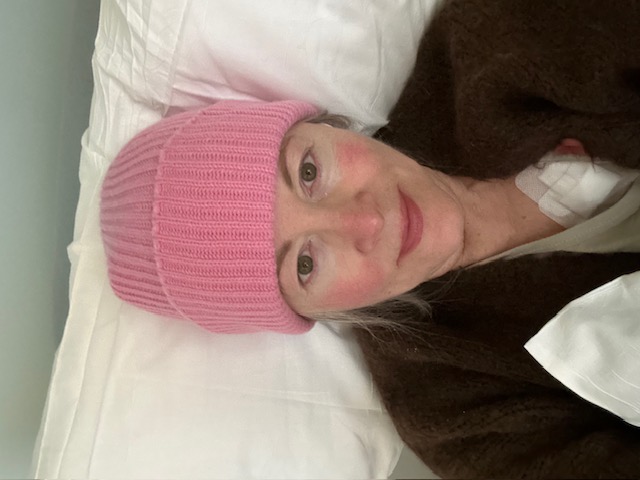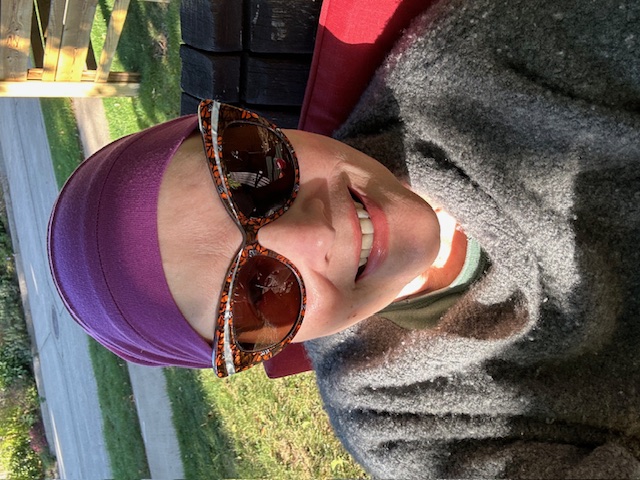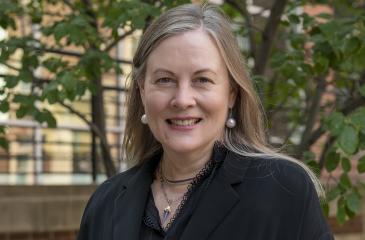The vital role of cancer research: MCC's Dr. Carol Lange shares her personal journey of discovery and hope
In the world of medical science, research is not just a collection of data and theories—it’s a lifeline for many. For Carol Lange, PhD, a professor of medicine and pharmacology at the University of Minnesota and associate director for basic sciences at the Masonic Cancer Center (MCC), this truth resonates deeply. A dedicated researcher in breast cancer, Dr. Lange’s commitment to understanding the disease took an unexpected turn when her own health was at stake.
At the annual MCC Research Symposium in 2022, Dr. Lange learned about a groundbreaking study authored by guest speaker Dr. Laura Esserman (UCSF) called the WISDOM Study that was seeking participants with the aim of revolutionizing breast cancer risk and detection. Intrigued by the prospect of participating in the type of research she herself conducts, and concerned about her personal risk factors, she signed up. Little did she know, that decision would have life-saving implications.
The wake-up call
After signing up to participate in the WISDOM Study in 2022, Dr. Lange’s risk was considered “normal” with no new interventions needed, other than an annual mammogram. However, in late fall of 2023, she received a letter from the study team indicating that, at the age of 60, she was now classified as high risk for breast cancer. The letter from the study team recommended that Lange get an annual MRI of her breast tissue in addition to her mammograms—an essential step that her insurance would likely not have covered without the study's intervention.
After navigating the bureaucratic maze to secure her MRI and have it covered by insurance, Dr. Lange received shocking news: The scan revealed a tumor that had evaded detection through mammography and was even undetectable through physical examination.

“My cancer would not have been detected if I wasn’t in that trial,” she reflects. “It probably saved my life. There’s no way the insurance would have paid for the MRI otherwise.”
Diagnosed with triple-positive breast cancer—a cancer that tests positive for estrogen receptors, progesterone receptors, and amplification of the HER2 gene resulting in high levels of the HER2 protein, Dr. Lange was able to participate in the I-SPY clinical trial, which tests innovative therapies for breast cancer that may outperform standard treatments.
When a patient is eligible for and elects to participate in the I-SPY trial, a medical team collects a small part of the patient’s tumor via biopsy. That biopsy is safely transported to the lab where it undergoes molecular testing. This molecular testing can help give a patient and their doctor more information about their cancer, which helps with planning treatment.
In Dr. Lange’s eyes, the revelation about her own health provided by the trial underscores the importance of ongoing cancer research and participation in such studies. That’s because cancer clinical trials do not only advance scientific understanding, they also provide critical interventions for people at risk—like Lange herself.
With her team’s support, Dr. Lange navigated the tumultuous waters of cancer treatment, experiencing both setbacks and triumphs. After an initially unsuccessful drug regimen, adjustments were made to her treatment plan, leading to significant tumor shrinkage. “I feel so grateful and lucky to be part of these trials,” she shares. “It’s incredible to be in the right place at the right time to participate in this kind of research.”
A lifelong dedication to research
Dr. Lange’s journey in medicine began as an independent faculty member at UMN following many years of PhD (1991) and postdoctoral training (1992-1998). Her cancer research began in 1999 when she joined the Masonic Cancer Center as an assistant professor heading her own lab. With a doctorate degree focused on lung cancer signaling pathways, her interest in how cells in the body communicate with one another led her to breast cancer studies for the completion of her postdoctoral training. Over the years, her independent research on breast cancer has deepened to cover the complexities of hormone-driven cancers, revealing intricate interactions between hormones, their nuclear receptors, and signaling molecules that can influence treatment outcomes.
Reflecting on the whole of her journey in medicine, Dr. Lange feels that, in the past five years in particular, she is doing the best work of her career. “We’ve recently discovered that steroid hormone receptors interact in ways we hadn’t fully understood before,” she explains. “It’s like whack-a-mole; target one, and another pops up. Understanding these interactions opens new doors for improved targeted therapies.”

A steroid hormone receptor is a protein molecule that is located inside our cells and specifically binds to steroid hormones that easily enter cells like estrogen, progesterone, and testosterone. This binding process tells our bodies whether to activate or suppress a particular response from our genes, determining if our cells function as intended or not.
These processes are a key topic of research across various types of hormone driven cancers, such as breast, ovarian, prostate, and other cancers that have steroid hormone receptors in them. “Our understanding of steroid hormone receptors has opened up the field entirely,” says Dr. Lange. “We now realize that we have to study both the collection of different steroid hormones and the cancers that contain their receptors together, because they are all affected by the same process.”
Despite many advancements in this research, challenges remain. Current treatments often focus on primary tumors—the first or original tumor that is found in a patient’s body—but many cancer cells can escape to other parts of the body and lie dormant, only to resurface years later as new tumors. Dr. Lange’s research now explores how these cells operate and how to effectively target them.
In her eyes, the importance of clinical trials in modern medicine can’t be emphasized enough. “Clinical trials provide access to cutting-edge treatments that can be more effective than standard care,” Dr. Lange notes. Her own participation in trials has been instrumental not only for her but also for future patients.
Joy in the journey, and a call to action
Despite the chaos that cancer brings, Dr. Lange remains optimistic. She finds joy in small moments—sipping coffee outdoors, spending time with her beloved cats, and maintaining connections with friends and family, including a supportive partner who shares her passion for science.
“I always try to think about the good things in life,” she reflects. “One day at a time, and don’t forget to appreciate the little moments.”
Dr. Lange’s story illustrates not only the vital role of cancer research but also the profound impact of participating in clinical trials. Her experience serves as a powerful reminder that every study, every trial, and every new discovery can make a difference—both for individual patients and for the wider community.
As we continue to push the boundaries of cancer research, we honor patients and research leaders like Dr. Lange who are instrumental in furthering our understanding of this disease so that we can continue to write cancer’s last chapter.
The landscape of cancer treatment is ever-evolving. And that is precisely why it is so vital to support state-of-the-art research efforts and advocate for policies that prioritize patient access to innovative care. Together, we can forge a path toward a future where fewer lives are touched by cancer and more stories end in hope and healing.
